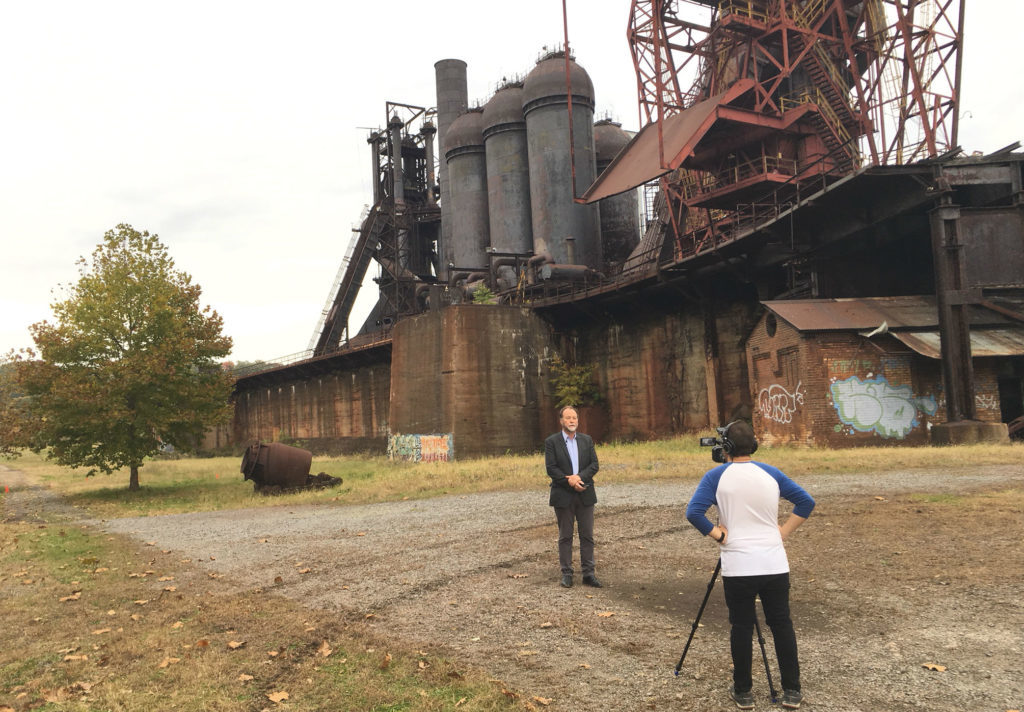
By Andy Brack, editor and publisher | The messages from a four-week tour across 10 states are loud and clear: The country is more divided than ever in modern history and the main issue in the midterm elections boils down to Donald Trump, which seems to be just the way he wants it.
On the whole, Trump supporters want to give the president more of a chance to shake things up despite economic risks. Farmers in Minnesota, for example, are willing for short-term pain if there is long-term gain. They are worried they may not have buyers for crops being stored in silos now because of a trade war in China, but they want the president to have more time to work a deal.
Meanwhile, Trump critics want to give the president a new Congress to put a check on him and his twitching twittering. And they’re energized more than ever to get out and vote in the midterm elections.
Here are several lessons learned in the listening trip across the country that will be used in a documentary called A Hard Road: Travels in Trump’s America.
Tone it down. The fiery rhetoric coming from Trump and Congress isn’t doing much to bring the country together, which is what the scores of people we talked with want. But it’s not only Trump’s shoot-from-the-hip tirades on Twitter, campaign speeches or impromptu interviews. It’s also all of the negative ads from all candidates and the nasty media retorts by Trump critics. Fanning the flames, too, are media that spread the viciousness of Republicans and Democrats. Voters want everyone to tone it down, even though that seems to be more daunting than past attempts at nuclear disarmament talks.
Find more unity. Perhaps one way to get things toned down is for leaders to work on issues where they really aren’t that far apart. There are bipartisan issues that offer paths to building trust and progress, such as ways for legal immigration to continue while protecting borders; investing in infrastructure to rebuild roads and blighted communities; and finding reasonable spending cuts to put a tourniquet on the nation’s bad habit of borrowing money.
Listen more. Leaders on both sides need to listen more to people throughout the country, not just consume media that supports their ideological bent. Many Trump supporters believe what the president is doing is responding to frustrations that have not been heard by leaders in years. While Trump may just be using their frustrations for political gain, his supporters believe he is listening — and that’s fueling his power. If more people listened, more would get done.
Media responsibility. We’re not a believer in so-called fake news. That phenomenon is nothing but people not accepting facts because they don’t like them. But a lot of what passes on cable news these days is more opinion than actual news. It’s infotainment offered to generate bigger ratings and more money for networks. Just as we want leaders to tone down their rhetorical spasms, the media need to report news and get rid of commentators who purportedly add context but really are spewing little more than partisan talking points. Side note: Maybe the media can stop bursting into a hyper-frenzy on every Trump tweet. This magnifies the impact. Why not start ignoring them?
It’s the economy. In Trump’s favor now — and probably why people are willing to cut him some slack — is the fact that the economy is rolling along and unemployment is low. If his gamble with higher tariffs doesn’t pay off, the political playing field could change quickly and Trump may find it harder to keep supporters, particularly when they wake up and realize all of the manufacturing jobs lost in the U.S. aren’t coming back because of technological innovation and automation. One historian, for example, told us it takes 10 percent of the manpower today to make the same amount of seill that it did in Pittsburgh’s heyday when tens of thousands of workers made half of the world’s supply. Today, the Pittsburgh area has just two working steel plants.
Trump has added a new, vitriolic layer to the American experiment with democracy. If Democrats win control of the House, they’d be well-advised to work on a unity agenda, not constantly do battle with the president.
- Have a comment? Send to: feedback@statehousereport.com.


